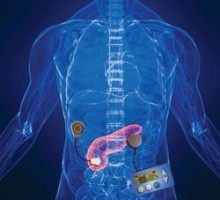- Home
- Editorial
- News
- Practice Guidelines
- Anesthesiology Guidelines
- Cancer Guidelines
- Cardiac Sciences Guidelines
- Critical Care Guidelines
- Dentistry Guidelines
- Dermatology Guidelines
- Diabetes and Endo Guidelines
- Diagnostics Guidelines
- ENT Guidelines
- Featured Practice Guidelines
- Gastroenterology Guidelines
- Geriatrics Guidelines
- Medicine Guidelines
- Nephrology Guidelines
- Neurosciences Guidelines
- Obs and Gynae Guidelines
- Ophthalmology Guidelines
- Orthopaedics Guidelines
- Paediatrics Guidelines
- Psychiatry Guidelines
- Pulmonology Guidelines
- Radiology Guidelines
- Surgery Guidelines
- Urology Guidelines
Breakthrough: New drug combo may regenerate insulin-producing beta cells

New York, NY: Breakthrough, in a pursuit to find a cure for diabetes that restores the body's ability to make insulin, the scientists have created a new drug cocktail that can induce insulin-producing beta cells to proliferate at high rates.
The study, published in the journal Cell Metabolism, reveals how a novel combination of dual-specificity tyrosine-regulated kinase 1A (DYRK1A) inhibitors and transforming growth factor-beta (TGFβ) superfamily inhibitors can make adult human beta cells replicate at a rate of 5–8 per cent per day.
This research is significant as a diminished supply of functioning insulin-producing beta cells -- is a common factor in both type 1 and type 2 diabetes.
Andrew F. Stewart, director at Mount Sinai Diabetes, Obesity, and Metabolism Institute, New York, NY, USA, and colleagues in their earlier work, had investigated a small molecule called harmine that blocks an enzyme DYRK1A. This molecule led to a beta cell proliferation rate of 1.5 to 3 percent. So, they conducted this study to investigate whether a combination of DYRK1A inhibitors and TGFβ superfamily inhibitors would enhance beta cell proliferation.
Also Read: Sulfonylureas, Insulin increase heart disease risk in diabetes : JAMA
"We are very excited about this new observation," says Dr. Stewart, "because, for the first time, we are able to see rates of human cell beta cell replication that are sufficient to replenish beta cell mass in human beings."
In the new study, the team demonstrated how adding a small molecule from a different class of drug raised the proliferation rate to an average of 5–8 percent. The second drug blocks members of TGFβ superfamily.
While the study has taken an important step by showing that the drug combination can regenerate beta cells fast enough for treatment, there is still some work to do, note the authors. "The next big hurdle is figuring out how to deliver them directly to the pancreas," explains Dr. Stewart.
Also Read: No more hypoglycemia: Scientists Develop first glucose-responsive insulin
This was a major step forward. However, the rate of new beta cell production was too low for the treatment to be effective in humans with diabetes.
The study also explores the mechanisms behind the "remarkable rate of proliferation." The findings show that the drug combination works not only in beta cells that scientists recovered from "normal cadaveric human islets," but also in beta cells that they grew from human stem cells and "those from people with type 2 diabetes."
"Since these drugs have effects on other organs in the body, we now need to develop methods to deliver these drugs specifically to the beta cell in humans."
For further reference log on to https://doi.org/10.1016/j.cmet.2018.12.005

Disclaimer: This site is primarily intended for healthcare professionals. Any content/information on this website does not replace the advice of medical and/or health professionals and should not be construed as medical/diagnostic advice/endorsement or prescription. Use of this site is subject to our terms of use, privacy policy, advertisement policy. © 2020 Minerva Medical Treatment Pvt Ltd